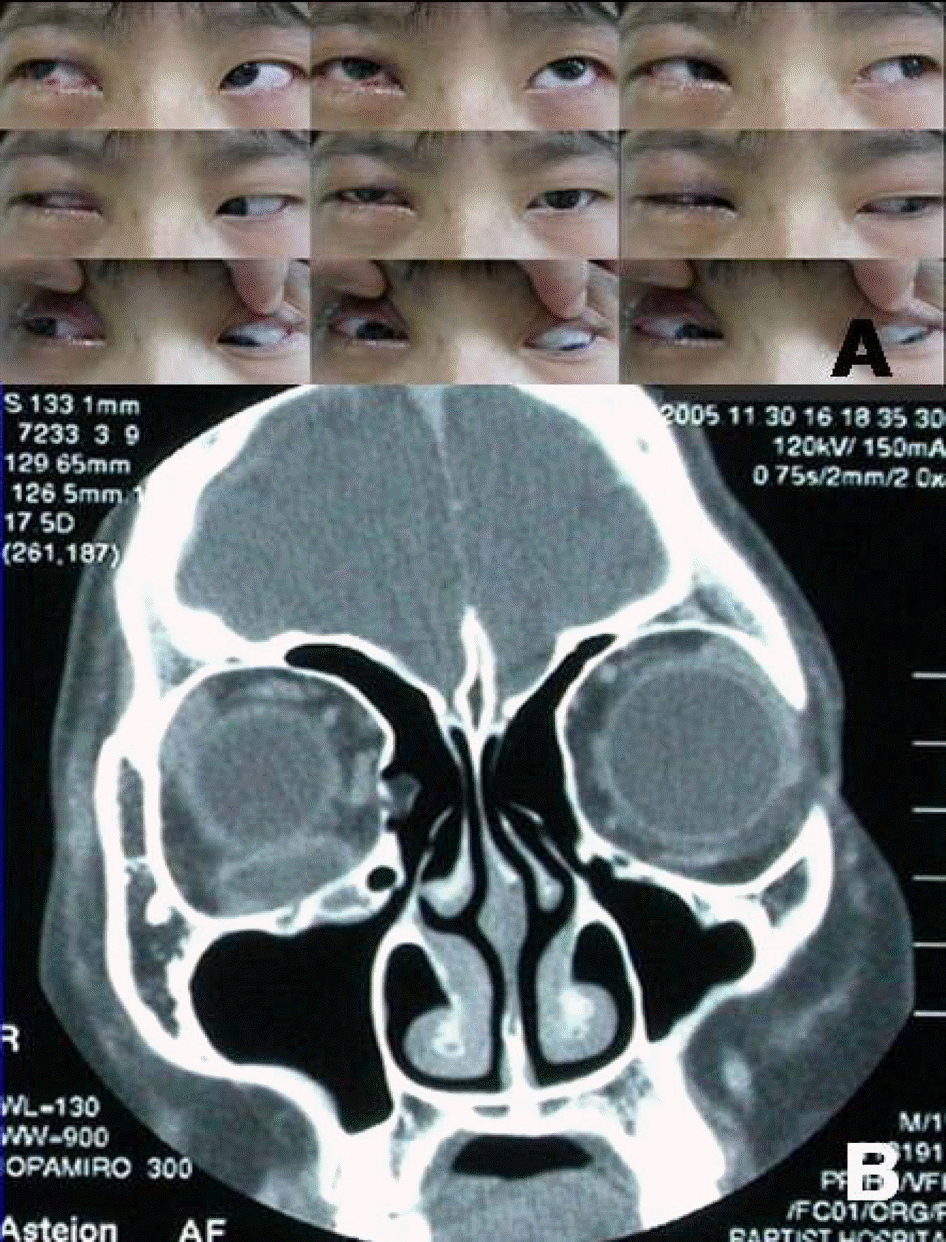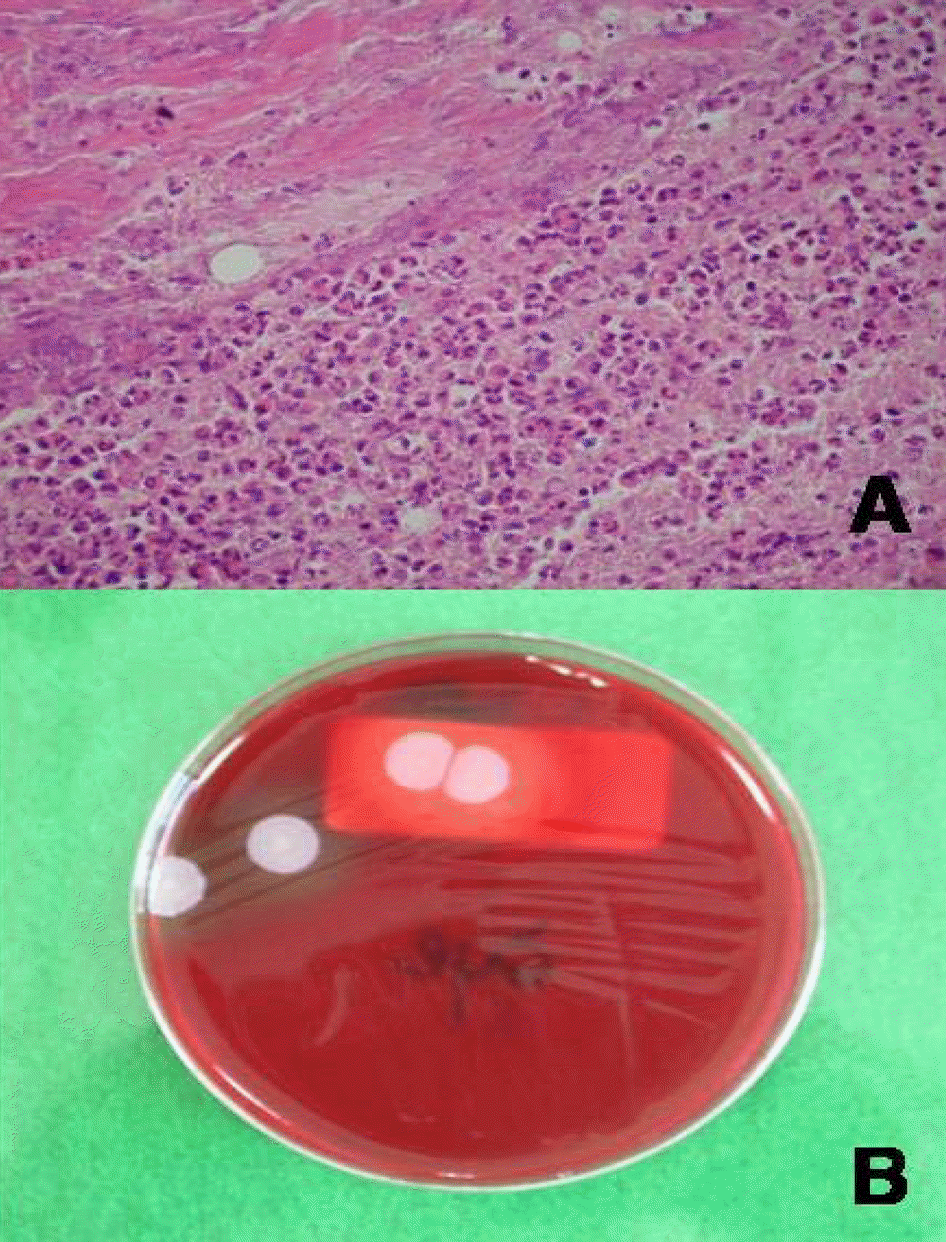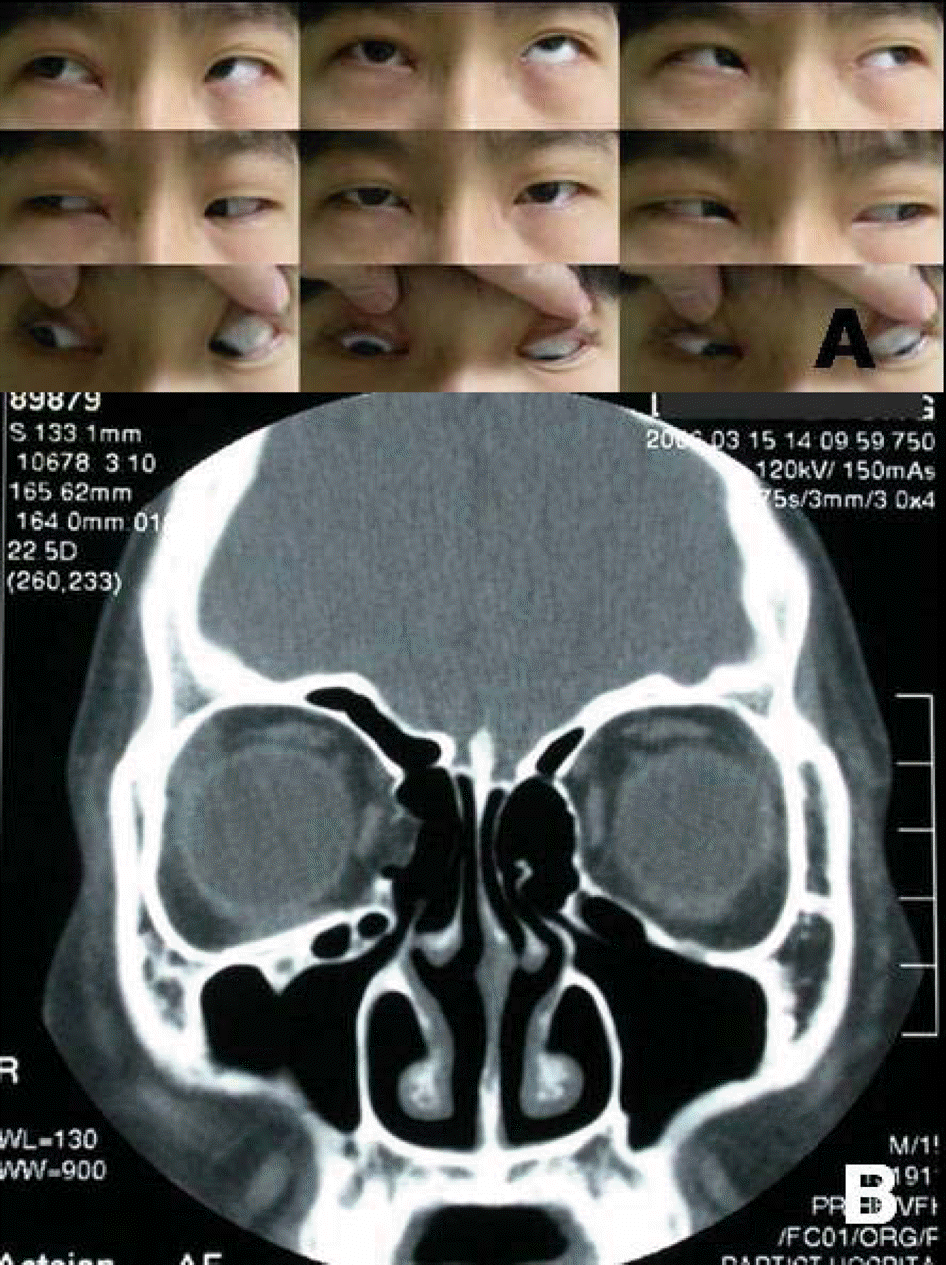Abstract
Purpose
To report a case of acute orbital abscess after Medpor implantation for orbital floor fracture repair.
Case summary
A 15-year-old boy who was punched in the right orbit visited our clinic because of diplopia. An orbital CT scan demonstrated a fracture of the right orbital floor. At surgery, a Medpor sheet was placed over the orbital floor defect. Over the first three days, clinical improvement was gradual, but at four days postoperatively, depression of the right eye was restricted, and lower lid edema and proptosis was present in the right eye. At eight days postoperatively, the orbital CT scan showed a large cystic mass surrounding the Medpor sheet and fine needle aspiration cytology showed a number of inflammatory cells. Because systemic antibiotics were ineffective, the Medpow sheet and the cystic mass were removed through a transconjunctival approach to the orbit. A culture of the removed Medpor sheet grew Staphylococcus aureus and signs of inflammatory cells in the tissue were present. After removal of the abscess, most clinical symptoms showed improvement except for the remaining depression of the right eye.
Conclusions
Symptoms of eye movement restriction, lower lid edema, and proptosis may be uncommon after orbital floor fracture repair but can occur. We should also consider the possibility of abscess formation due to infection of the implant and emphasize the importance of prompt diagnosis and treatment of such a case.
Go to : 
References
1. Hunter D, Baker S, Sobol SM. Split calvarial grafts in maxillofacial reconstruction. Otolaryngol Head neck Surg. 1990; 102:345–50.

2. Rubin PA, Bilyk JR, Shore JW. Orbital Reconstruction using porous polyethylene sheets. Ophthalmology. 1994; 101:1679–708.

3. Mauriello JA Jr, Hargrave S, Yee S, et al. Mostafavi R, Kapila R. Infection after insertion of alloplastic orbital floor implants. Am J Ophthalmol. 1994; 117:246–52.
4. Morrison AD, Sanderson RC, Moos KF. The use of Silastic as an orbital implant for reconstruction of orbital wall defects: review of 311 cases treated over 20 years. J Oral Maxillofac Surg. 1995; 53:412–7.
5. Custer PL, Lind A, Trinkaus KM. Complication of Supramid orbital implants. Ophthal Plast Reconstr Surg. 2003; 19:62–7.
6. Young VL, Schuster RH, Harris LW. Intracerebral hematoma complicating split calvarial bone-graft harvesting. Plast Reconstr Surg. 1990; 86:763–5.

7. Lin KY, Bartlett SP, Yaremchuk MJ, et al. The effect of rigid fixation on the survival of onlay bone grafts: an experimental study. Plast Reconstr Surg. 1990; 86:449–56.
8. Gruss JS. Complex nasoethmoid-orbital and midfacial fractures: role of craniofacial surgical techniques and immediate bone grafting. Ann Plast Surg. 1986; 17:377–90.

9. Mauriello JA Jr, Fiore PM, Kotch M. Dacryocystitis, Late complication of orbital floor fracture repair with implant. Ophthalmology. 1987; 94:248–50.
10. Mauriello JA Jr. Inferior rectus muscle entrapped by Teflon implant after orbital floor fracture repair. Ophthal Plast Reconstr Surg. 1990; 6:218–20.
11. Polley JW, Ringler SL. The use of Teflon in orbital floor reconstruction following blunt facial trauma: 20-year experience. Plast Reconstr Surg. 1987; 79:32–42.
12. Kang SJ, Kwak IH. Hematic cyst formation after repair of blow-out fracture. Korean J Ophthalmol. 1996; 10:60–2.

13. Neves RB, Yeatts RP, Martin TJ. Pneumo-orbital cyst after orbital fracture repair. Am J Ophthalmol. 1998; 125:879–80.

14. Glavas IP, Lissauer BJ, Hornblass A. Chronic subperiosteal hematic cyst formation twelve years after orbital fracture repair with alloplastic orbital floor implant. Orbit. 2005; 24:47–9.
15. Lee SB, Park KS, Kim YD. Orbital cyst after repair of blow-out fracture. J Korean Ophthalmol Soc. 1999; 40:273–7.
16. Bae JH, Kwak MS. Clinical experience of orbital wall reconstruction using Medpor barrier sheet implant. J Korean Ophthalmol Soc. 2001; 42:1515–22.
17. Lee SH, Cho KS. Clinical experience with Medpor implant through transconjunctival incision in blow-out fractures. J Korean Ophthalmol Soc. 1998; 39:823–9.
18. Kim HK, Lim HS, Chung HS. Surgical effect of Medpor in the reconstruction of orbital wall fracture. J Korean Ophthalmol Soc. 1998; 39:623–30.
19. Paik SH, Park MS, Lee TS. Simultaneous transconjunctival and transantral approach for repair of blowout fracture by using Medpor orbital implant. J Korean Ophthalmol Soc. 2000; 41:1–7.
20. Merritt K, Shafer JW, Brown SA. Implant site infection rates with porous and dense materials. J Biomed Mater Res. 1979; 13:101–8.

21. Shanbhag A, Friedman HI, Augustine J, von Recum AF. Evaluation of porous polyethylene for external ear reconstruction. Ann Plast Surg. 1990; 24:32–9.

22. Berghaus A. Porous polyethylene in reconstructive head and neck surgery. Arch Otolaryngol. 1985; 111:154–60.

23. Dougherty WR, Wellisz T. The natural history of alloplastic implants in orbital floor reconstruction: an animal model. J Craniofac Surg. 1994; 5:26–32.
Go to : 
 | Figure 1.(A) 4 days postoperatively, depression of the right eye was restricted, and lower lid edema and proptosis was present in the right eye. (B) 8 days postoperatively, the orbital CT scan showed a large cystic mass surrounding the Medpor® sheet. |




 PDF
PDF ePub
ePub Citation
Citation Print
Print




 XML Download
XML Download